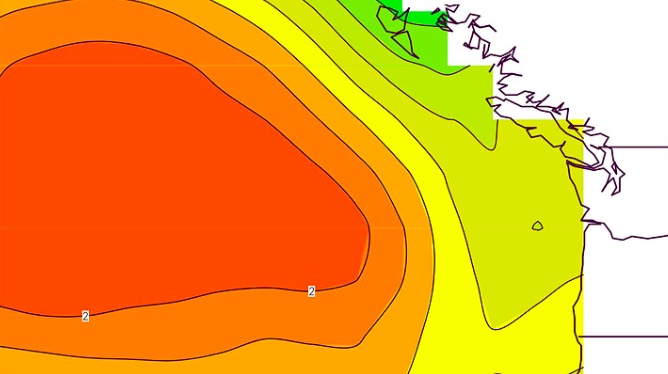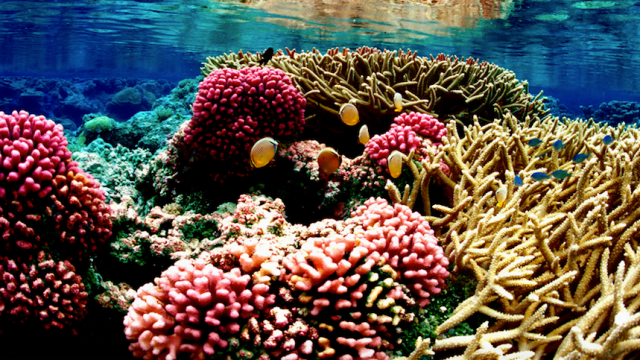Beneath the swelling blue surf, ocean life is on the move. Marine species are swimming into new new communities and forcing others out. By the end of the century, the ecosystems that cover 70 per cent of our planet’s surface will look completely different.
“The changes we’re seeing in response to climate change are much faster than the last millions of years, but maybe ever in the history of the planet,” marine ecologist Ben Halpern of UC Santa Barbara told Gizmodo.
Most of us aren’t aware of how quickly the seas are shifting. But Halpern is co-author on a massive new ocean biodiversity analysis that appears this week in Nature Climate Change. His study shows, for the first time, just how profoundly rising temperatures are going to scramble marine communities worldwide. In many parts of the ocean, biodiversity will increase as temperatures become more favourable to a wider range of species.
While that sort of sounds like a good thing, there’s a trade-off: Marine ecosystems everywhere are going to start looking the same. And as the patchwork nature of ocean life fades, species with very narrow ranges could be lost forever.
Shifting Seas
In the study, Halpern and his co-authors used two 21st century global climate models (Representative Concentration Pathways, or RPCs) to predict the changing distribution of nearly 13,000 species across our planet’s warming oceans. It’s not the first time scientists have studied how marine species will shift with climate change. But most previous models include complex life history traits — such as larval dispersal rates — for which data is scarce.
The models in the new study were far simpler, relying on the sole assumption that species ranges track water temperatures. “Water holds and conducts heat a lot more than air does,” Halpern says. “Species in the water respond to temperature as a key driver of everything about their life.”

While that assumption rubs away some of the nuance of animal dispersal, it allowed the researchers to model nearly 12-fold more species than every before, and to draw the very first global conclusions.
Overall, Halpern and his team found that global warming will tend to increase marine community diversity. But widespread invasions will homogenize distinct groups, and this could lead to high rates of local extinction. What’s more, parts of the ocean known for their astounding diversity today may become biological deserts.
“The worst climate scenarios are showing that a lot of species will move out of the tropics, which will just be too hot for them,” Halpern says. “There’s always a chance that coral species will also be able to migrate and set up new communities. But my guess is that it’s not going to happen that way and you’ll end up losing a lot of communities.”
Polar regions, conversely, are already seeing an influx of lower latitude life forms as the mercury rises. How cold-adapted species will cope with the fairer weather and the extra neighbours isn’t yet clear.
“Things seem to move in faster than they leave,” Halpern says. “That’s part of why you see overall species richness expanding. What that means for the poles is you’re going to get a lot of species moving in and initially see species richness increase, in some cases dramatically. The current species that are there are going to hang out for a while, but eventually they won’t be able to tolerate it any more and they will go extinct.”
There’s a human cost to all of this, as well. As Halpern puts it, the scrambling of economically valuable species could be a boon for the fishing industry in some parts of the world, while others will be left high and dry.
“Life as people know it now in terms of how they interact with the ocean will undeniably be different,” Halpern says. “That may be better for some, but for others it will be a catastrophe. If your culture is dependent on a species that moves out of your waters, that’s a big part of your identity that’s disappeared.”
There’s Still Hope!
This alls sound pretty depressing, but there’s still time for us to turn things around. Global leaders are meeting this December to hash out a climate treaty that could very well determine the course of the next several centuries — for humans and the oceans. If we can commit ourselves, as a planet, to widespread carbon reductions, we can still minimise the damaging effects of climate change.
If not? All the more reason to stop treating the oceans like our personal dumpster.
“There’s already a whole set of things we’re doing to the oceans that stress species, from pollution to overfishing,” Halpern says. “These are sort of the background set of challenges species face as they deal with shifting climate. If we can reduce pressures from other human activities, it will make it a little easier for species to adapt.”
[Read the full scientific paper at Nature Climate Change via UCSB News]
